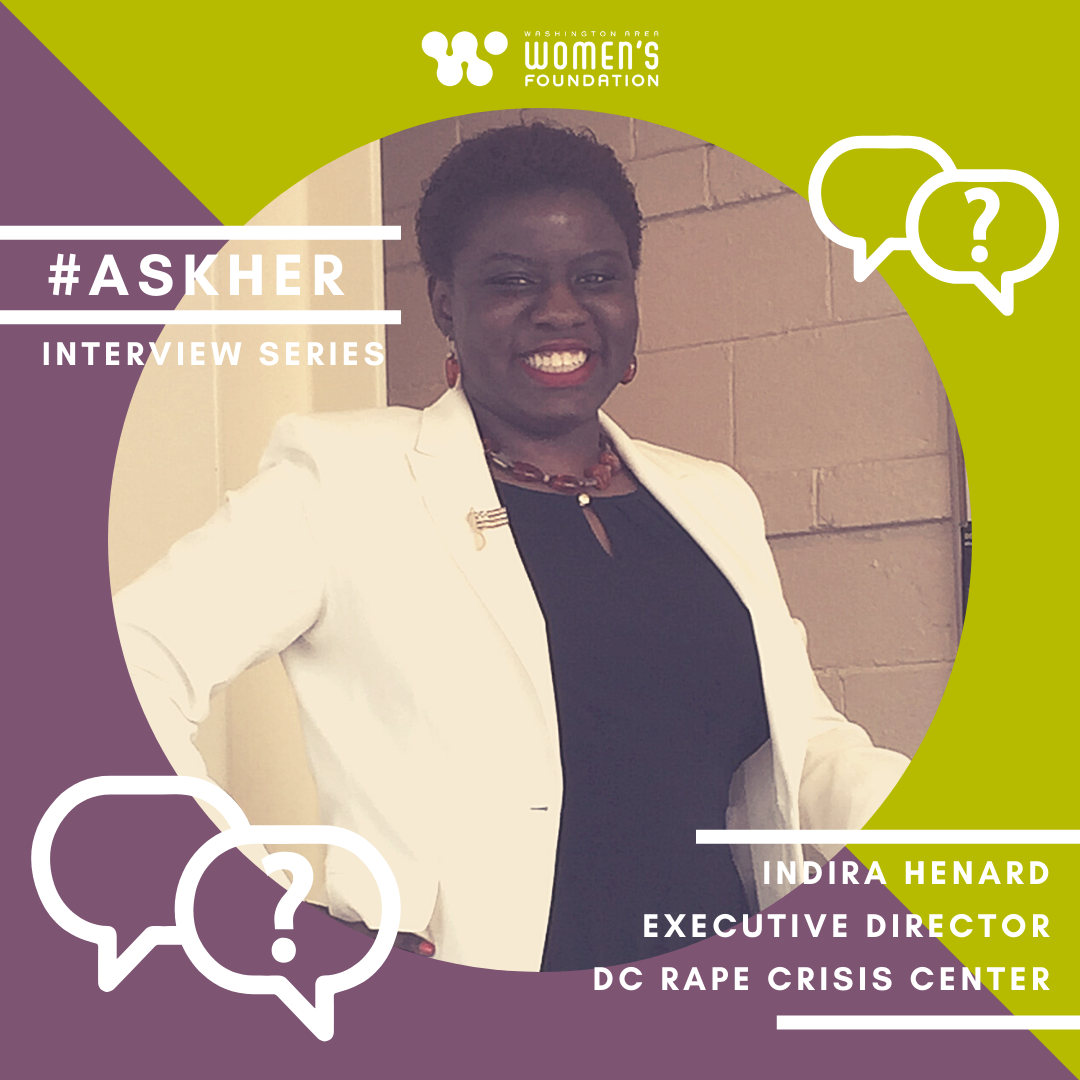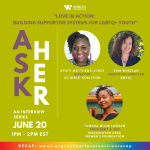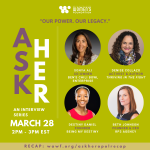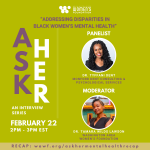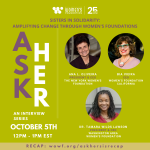Our new #AskHer series is an interview with our partners, community members and supporters who work tirelessly for women and girls. Our first interview is with Indira Henard, Executive Director of DC Rape Crisis Center. The interview was conducted by our Vice President of Programs, Martine Sadarangani Gordon.
April is Sexual Assault Awareness Month. As we enter the second month of our local stay-at-home orders, we are sensitive to the impact of the crisis on survivors of sexual violence.
To better understand these issues, we talked to Indira Henard, Executive Director, DC Rape Crisis Center (DCRCC). Her answers to our questions shined the light on what survivors may be experiencing right now and how our community can support survivors during this crisis.
Martine Gordon: Let’s start with a little about you and the DC Rape Crisis Center for our readers.
Indira Henard: My name is Indira Henard, and I am the Executive Director of DC Rape Crisis Center (DCRCC). It is the first and oldest rape crisis center in the country. I have been in the violence against women’s moment for 20 years and have been at the DCRCC for 12 years.
We serve the entire region, including Maryland and Virginia, but the majority of our clients come from Wards 5, 7, and 8 in DC. Whether you were sexually assaulted 48 years ago, 48 months ago, or 48 days ago, you can still come to us for services. This is what we call soul work because the journey to healing is life-long.
MG: How has DCRCC had to shift its work to continue to support survivors right now?
IH: We’ve had to do a lot of shifting. Right now, all of our services are virtual. We are serving close to 100 individual therapy clients, seeing all of them virtually via telehealth. We’ve also added extra lines to our 24/7 hotline because we’re seeing a significant increase in demand for services.
We’re also doing training and technical assistance virtually. Part of what the DCRCC does is that we do training and technical assistance for both local and national community partners. For example, we typically do a lot of technical assistance for schools, but most recently the training has focused on what COVID crisis response looks like for agencies that are culturally specific.
At the end of this month we’re also hosting a survivor check in call. I’ll be leading the call with clients to check in and create space for them. Normally I meet with our clients quarterly, but April is Sexual Assault Awareness Month, so I wanted to do something special for them.
MG: What should people know about survivors, or people who experience abuse/violence during this pandemic that they may not otherwise read or hear about?
IH: A lot of what abuse is connected to is power and control. We’re living in an unprecedented time because survivors have limited control being forced into quarantine. It is kicking up all of the issues around trauma and not feeling safe, and all of this is happening on a timeline where no one knows when it will end.
We know how the body holds trauma and the brain stores memory. When you have no control over where you can go, it brings up a lot, coupled with when your daily routine and your sense of normalcy is no longer the same.
We also know that home may not be a safe space. For survivors of sexual violence, being at home may be with your perpetrator and could be triggering or even increase the incidences of rape. Even if you want to try to leave to go somewhere safe, the shelters aren’t taking in new people. You’re in a catch-22.
Alternatively, home may be safe for you right now, but if you’re at home with people who don’t know you’ve been assaulted, being able to find a private space to do tele-therapy may not be an option.
I think the other big shift is in general — what we know is that sexual violence is not a single issue because we don’t live single issue lives. Even though DCRCC supports survivors with trauma, we’re seeing other things come up. We have clients who may also be dealing with other mental health or substance abuse issues. This crisis is making it harder to do referrals to programs that they may need beyond support as a survivor.
MG: Are there local government responses to the pandemic that have impacted survivors in unexpected ways?
IH: One example here in DC is that over 20 metro stations have been shut down. If they relied on public transportation but the hours have been cut and stations closed, that’s impactful. It creates a challenge with trying to go to the grocery store or getting medical assistance.
Because the region in general has basically gone virtual, we’re assuming that people have access to the technology, but if we’re looking at folks in Wards 5, 7, and 8, they may not have that technology.
MG: Many local governments are also anticipating significant budget cuts coming. How does this impact DCRCC’s ability to provide support to its clients?
IH: It is weighing heavy on our minds. DC Mayor Muriel Bowser announced a $600 million budget shortfall for this fiscal year, which is enormous. For the upcoming fiscal year, they are expecting an even larger shortfall. One of our key government funders has already made it clear that it will be a very lean fiscal year. For organizations like DCRCC who work with survivors, hearing that there will be strong budget cuts is catastrophic to our work because what we are expecting coming out of this pandemic is a surge in request for services.
My hope is that folks will realize that there is an intersection of trauma as it relates to the impact that COVID-19 is having. And it’s not just for survivors of domestic violence or sexual assault. These are intersectional issues for the most vulnerable residents. Even though a client may not be living in a shelter, for example, we have to understand the impact may look different for them – but there is an impact.
Generally, rape crisis centers across the country are struggling to stay afloat and fight for dollars in the next wave of federal funds, as well. Government funding will be challenging going forward, so it will take the support of the philanthropic community and donors to keep us afloat.
MG: Tell us about how your team is doing. How are they approaching their work, and, if you have a sense, how are they feeling right now?
IH: My team has just been troopers. They continue to knock it out of the park. This is the first time in 48 years at DCRCC that we’ve done virtual work like this, and they executed the transition seamlessly.
The way we approach our work is with heart. There is a saying we have that this is not hard work; its heart work. First and foremost, we have to show up with heart. My team bears witness to the unimaginable. We meet survivors where they are, and we create multiple pathways for their healing journeys. Survivors are the GPS from which we take directions. That has always been our philosophy, but it’s even more so now.
We are a small but mighty team and close knit. We have weekly check-ins and weekly self-care Friday calls. I talk to every staff member and have one-on-one time with every staff member, and I try to do things to make their days a little extra special because I know they are working really, really hard.
I’m also intentional around making sure they still have professional development opportunities in the midst of this crisis. In a nut shell, they are doing ok, but it’s definitely been challenging.
MG: What do survivors need right now, and looking six months out, what do you think the survivor support space will need when society enters the recovery phase of the pandemic?
IH: I think on a basic level, we need to believe survivors. We need to meet them where they are. We need to remind them that they are not alone and that what they are experiencing in healing is normal and expected. Sometimes we forget about those basics and how they mean so much.
On a higher level, we need philanthropic and systemic support to agencies who are on the ground with survivors. We need help, and we cannot do it alone. This is going to be a marathon, not a sprint, and when we enter the recovery phase, it will be fierce. We expect a significant surge in survivors, and we are going to need to meet that demand.
I encourage donors to trust your grantees. Trust them to know what is happening on the ground. Know that the resources being given to them are going to be used and maximized in the most efficient ways.
There is not a walk of life that sexual violence does not impact, and as such, everyone should be supporting sexual violence work. I would encourage folks to support those agencies on the ground. DCRCC is entering into our 48th year, and there is no way we could have done that without the support of the community.


